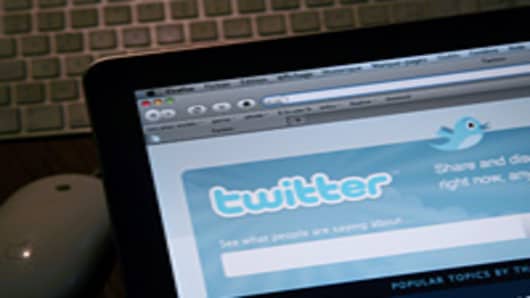I may be CNBC’s resident skeptic, but I was on a panel the other night at the New York Stock Exchange sponsored by StockTwits, a community for investors and traders launched on the Twitter platform.
“Twitter at $5 billion—long or short,” was the question from StockTwits founder Howard Lindzon.
My take—and that of most on the panel: Long.
Okay—I’m biased. I’m an active Twitter user (@herbgreenberg) and I believe its potential is untapped—not just as a form of social media, but an extremely under-used platform for mainstream media as it discovers Twitter's power as a news dissemination tool.
There is nothing faster than tweeting a bulletin or something newsworthy and following up online with the actual story—followed by yet another tweet with the link. It sounds backwards, but in this era, it really isn't.
No news organization can give me the down-and-dirty in Egypt real-time like NBC’s Richard Engel (@richardengelnbc) or the New York Times' Nicholas Kristof (@nickkristof) via their tweets from Cairo’s Tahrir Square. (It gives his 22,000 followers that much more reason to tune into the NBC Nightly News to see his full reports. Or the Kristoff's one million followers reason to read his full reports in the Times.)
Their tweets flow directly into the personal news feed I’ve created using Engel and 127 other smart people (including journalists, venture capitalists, entrepreneurs and analysts – most of whom I’ve never met) who report, opine and/or link to interesting stories—in 140 characters or less.
It has reached the point where my Twitter feed has become my day’s first read before the New York Times and Wall Street Journal (whose stories are often part of that feed.)
And it’s what I check repeatedly throughout the day.
News organizations that don’t figure this out risk slipping into irrelevance or in the very least left behind, which is where the still untapped and unrecognized value of Twitter comes in: There are those who believe it can ultimately charge for integrating its platform into mainstream news operations—and charge for it.
MarketWatch founder (and my former boss) Larry Kramer, who wrote the book, “C-Scape,” says that if he were creating MarketWatch today he would have gladly paid Twitter to use its platform to create free news alerts rather than the considerable amount he spent to build the software required for those alerts. (You can read his take on Twitter’s valuation here.)
And that’s before the most obvious revenue stream—advertising.
The obvious concern is whether the company can truly generate enough revenue to grow into its value. Silicon Valley author and someone I consider among the clearest thinkers about fads and crazy valuations, Andy Kessler, said in an interview last week with Lindzon that Twitter is little more than "a fax machine" with big reach, but "what will they do to really scale revenue?'" (Click here for the video.)
Still, the potential to scale revenue is so great that I hear Twitter’s founders are in no rush to sell; they truly believe, I am told by those who should know, that at some point a value like $10 billion today might have been giving the company away.
On the other hand, if they wanted to cash out now: There is no way Twitter would fetch values like that with an IPO. (Even I would be raising all kinds of red flags.)
I’ll go so far as to say that I believe going public right now, regardless of the valuation, would be the worst exit for Twitter. It would create too much noise and distraction, especially if its numbers where there for all to see and scour.
But for a company like Google whose founders are believed to be tight with the Twitter crew, it would be additive.
What would be the right price?
Kramer, who sold MarketWatch to Dow Jones for $520 million and sits on multiple media company boards, says it depends on who the buyer is.
“For Google to buy it with their stock, it could easily be worth that much, much the same way YouTube was worth the billions Google paid for it,” he says. “When you have some much future growth priced into a stock, that stock can be used loosely to do things that enhance the existing platform. Like YouTube did, twitter can create an even deeper, more engaged, relationship between Google and its existing users by buying it for Google stock."
“Simply put, it will give Google even more time with its users, which presumes that Google will use that time and engagement to extract more from those users, either directly or through increased advertising.”
Not to mention snaring a pretty neat technology that is certainly changing my world.
Questions? Comments? Write to HerbOnTheStreet@cnbc.com
Follow Herb on Twitter:



